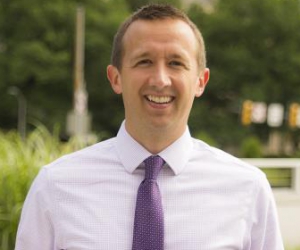
Helping the Well-Being of College Athletes Through the Science of Sleep
For college athletes seeking a competitive edge in their sport, a good night’s sleep can do wonders. Getting enough shut-eye often improves athletic performance and reduces feelings of anxiety and depression.
A new review co-authored by researchers from the University of Pittsburgh School of Education, the NCAA, and other universities and health systems provides recommendations for how collegiate athletic departments can facilitate better sleep habits of their college athletes. The recommendations are evidence-based and represent consensus from experts in the field.
The findings are published in the paper “Wake Up Call for Collegiate Athlete Sleep: Narrative Review and Consensus Recommendations from the NCAA Interassociation Task Force on Sleep and Wellness,” which appeared in the British Journal of Sports Medicine in June 2019.
Christopher Kline, an assistant professor in the Pitt Education Department of Health and Physical Activity, was part of the NCAA-appointed Interassociation Task Force on Sleep and Wellness who reviewed the new guidelines for sleep management and restorative sleep practices for college athletes.
“This report is the result of a nearly two-year-long effort by our group,” says Kline. “Our narrative review is the first to focus on the relationship between sleep and health and performance in collegiate athletes. After initially generating a long list of recommendations, we narrowed the list to only those recommendations that were likely to be of high utility andfeasibility. Our hope is that athletic departments are able to utilize these recommendations to improve the sleep health of their student-athletes, resulting in benefits to student-athletes’ athletic performance and overall health.”
The effort was in response to a call to action by the NCAA Sleep Summit in 2017.
Among the researchers’ recommendations:
● Conduct an annual collegiate athlete time demands survey
● Incorporate sleep screening into the pre-participation exam of collegiate athletes
● Provide both college athletes and their coaches with a sleep education program that includes information on sleep best practices, information about the role of sleep in optimizing athletic and academic performance and overall well-being, and strategies for optimizing sleep behavior of collegiate athletes
● Ensure that any sleep monitoring technology, if used on college athletes, is compliant with HIPAA and FERPA laws
While many college students have poor sleep habits, college athletes are especially at risk for neglecting sleep. Their schedules vary due to practice and games, mandatory team meetings, and other demands that prevent following a consistent sleep schedule. This is, of course, on top of the normal academic demands of a college student.
A 2015 study by the NCAA, for example, found that student athletes spent an average of between 27 – 41 hours per week on their sport — a time commitment that is akin to having a full-time job.
In this paper, the researchers conducted a thorough review of existing research on sleep and student athletes. They drew up an initial list of best practices and then contacted experts in the field who had attended the NCAA Sleep Summit. The experts were asked to score the best practices on the basis of utility and feasibility. In other words, how likely it was to work and actually be implemented. Only those recommendations with high scores for utility and feasibility made the final cut.
Funding for the research project was provided by the NCAA Sport Science Institute.
In addition to Kline, the other co-authors on the paper were from the University of Washington Departments of Pediatrics and Neurology, the Seattle Children’s Research Institute’s Department of Pediatrics, the NCAA, the University of North Carolina at Greensboro Department of Public Health Education, the University of Arizona at Tucson, the University of Chicago Orthopedic Surgery and Rehabilitation Medicine, the U.S. Naval Institute, and the University of St. Thomas Department of Psychology.
Kline conducts his research as a member of the Health and Physical Activity faculty at the Pitt School of Education. Last year, the faculty group generated nearly $3 million in grant-funded research in the study of health and wellness issues.
As a whole, the Pitt School of Education faculty generated $26.5 million in funded research in 2018-19.




